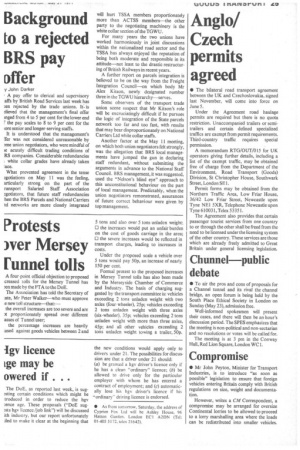Background to a rejected BRS pay offer
Page 27

If you've noticed an error in this article please click here to report it so we can fix it.
y John Darker A pay offer to clerical and supervisory affs by British Road Services last week has een rejected by the trade unions. It: is elieved that the management's final offer mged from 4 to 5 per cent for the lower end f the pay scales to 8 to 9 per cent for the tore senior and longer-serving staffs.
It is understood that the management's tier was not considered unreasonable by mne union negotiators, who were mindful of le acutely difficult trading conditions of RS companies. Considerable redundancies [ white collar grades have already taken lace.
What prevented agreement in the tense egotiations on May 11 was the feeling, articularly strong on the part of the ransport Salaried Staff Association agotiators, that future staff redundancies hen the 13RS Parcels and National Carriers td networks are more closely integrated will hurt TSSA members proportionately more than ACTSS members—the other party to the negotiating machinery is the white collar section of the TGWU.
For many years the two unions have worked harmoniously in joint discussions within the nationalized road sector and the TSSA has always enjoyed the reputation of being both moderate and responsible in its attitude—not least to the drastic restructuring of British Railways in recent years.
A further report on parcels integration is believed to be on the way from the Freight Integration Council—on which body Mr Alex Kitson, newly designated number three in the TGWU hierarchy—serves.
Some observers of the transport trade union scene suspect that Mr Kitson's role will be excruciatingly difficult if he pursues the logic of integration of the State parcels network too far and too fast, with results that may bear disproportionately on National Carriers Ltd white collar staffs.
Another factor at the May 11 meeting, on which both union negotiators felt strongly, was the allegation that BRS local managements have jumped the gun in declaring staff redundant, without submitting the arguments in advance to the National Staff Council. BRS management, it was suggested, used the "Nelson's blind eye" approach to this unconstitutional behaviour on the part of local management. Predictably, when the union negotiators remonstrated, assurances of future correct behaviour were given by top management.






























































































































